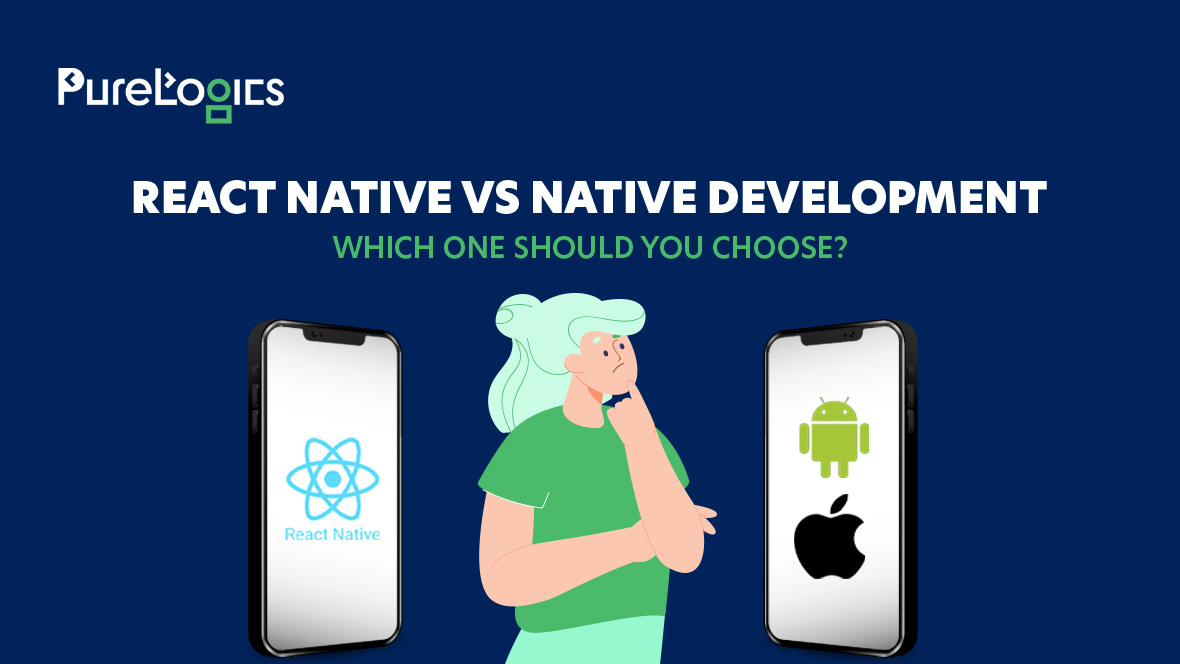The landscape of mobile app development is continuously evolving, and React Native has developed itself as a leading, high-quality player. But this is not an all-in-one solution; often, you need React Native alternatives to build a mobile app.
Here, we’ll delve into the world of React Native, discuss its pros and cons, and shed light on the best three React Native alternatives available on the market. After reading the blog post, you will surely make a well-judged decision for your upcoming mobile application project.
What is React Native?
React Native is one of the widely-used open-source frameworks designed by Facebook software engineer Jordan Walke. It allows software developers to create a mobile application with only JavaScript.
Building a mobile app using the React Native framework is much easier and budget-friendly because it creates cross-platform mobile apps with a single codebase. When you write your application once, you will run it on both iOS and Android devices.
The best feature of this technology is that React Native apps operate precisely like native apps.
Pros and Cons of React Native
Before we discuss React Native alternatives, let’s take a closer look at the advantages and disadvantages of React Native to better understand its strengths and limitations.
Pros of React Native
Following are some pros of React Native, one of the highly demanding frameworks of the present day:
Cross-platform compatibility: Write code once. It works on Android as well as iOS platforms and reduces development time and cost.
Extensive community and ecosystem: React Native has a strong community of developers. It offers a diverse ecosystem of libraries and plugins, which makes it easier to find specified solutions to common problems.
Hot reloading: Software development companies can quickly see the results of their code changes without redeveloping the entire app. So, yes, the hot reloading feature of React Native increases productivity a lot.
Native-like performance: Thanks to the native components of this framework, the applications developed on React Native offer near-native performance.
Budget-friendly development: As discussed above, you can use a single codebase for cross-platform mobile apps. So, it helps you save your hard-earned money as well as precious time.
Cons of React Native
Slightly lower performance: React Native provides you with access to multiple native features, but it still misses some advanced features for custom modules or native code integration.
Updating issues: It is challenging to keep the React Native app up to date with the most recent version of React Native. Yes, it is a difficult, but not impossible, process.
Now you have a brief understanding of what React Native is and what are its strengths and weaknesses. So, let’s discuss why you need to consider its possible alternatives.
Why Consider React Native Alternatives
React Native is undoubtedly a powerful open-source framework for creating mobile applications, but it’s not an all-inclusive solution that fits all sizes equally.
Using this framework, you can perform cross-platform mobile app development, but there are specific scenarios where you need React Native alternatives for your mobile app development projects.
You need alternatives to React Native if your mobile application needs unique features or wants access to particular native APIs. If React Native doesn’t support that particular API, you must explore alternatives.
If your React Native application is not ideal for graphics-intensive apps, mobile app developers will have challenges. Moreover, it is a daunting task to dive deep into the world of this framework. These are some reasons why developers search for alternatives to React Native.
Top 3 React Native Alternatives With Their Pros & Cons

Flutter
Flutter is one of the famous mobile app development frameworks developed by a giant of technology, Google. Flutter uses the Dart programming language.
It provides software developers with a diverse range of customizable widgets that they can use to build highly-native and high-performance applications for mobile, desktop, and web.
As it ensures quality, fast development, and offers hot reload features, Flutter has gained massive popularity among developers and business.
Following are a few benefits of using Flutter:
Stunning user interfaces: Flutter offers a diverse set of customizable widgets. This characteristic of Flutter enables developers to develop stunning User Interfaces (UIs).
Fast development: As mentioned above about the hot reload feature of Flutter, it speeds up the mobile app development process and allows for quick iterations when needed.
Single codebase: Like the React Native framework, Flutter also offers cross-platform mobile app development with one codebase.
Here are also a few limitations of Flutter you need to know:
- Flutter has a small community of developers in comparison to React Native.
- Fresh developers may face difficulties in understanding Dart (Flutter’s programming language).
- There needs to be more effort to access native modules in Flutter.
Ionic
Ionic is another highly recommended open-source software development kit (SDK) for building hybrid mobile apps. Ionic uses different programming languages, such as HTML, CSS, JavaScript, etc., to develop native-like experiences in Ionic mobile applications.
Moreover, Ionic depends on Angular; if you know how to use it properly, you must select Ionic. This framework also provides developers with multiple built-in components that make the whole process of development a breeze.
Here are some unmissable pros of Ionic:
- Ionic uses popular and highly accessible web technologies like CSS, HTML, and JavaScript. This makes Ionic an excellent choice for both developers and businesses alike.
- When it comes to smaller projects having limited budgets, Ionic offers rapid prototyping.
- Ionic has an extensive plugin ecosystem. It has a large library of plugins and extensions that you can use for extended functionalities.
Also, look at the following potential cons of using Ionic:
Ionic is highly suitable for many application projects, but it may not provide the same level of performance as native and other alternatives offer. This is because Ionic has limited access to native options and features.

NativeScript
NativeScript is another highly-employed open-source framework to perform cross-platform mobile app development. The programming languages it uses are JavaScript, Angular, or TypeScript.
The interesting thing about NativeScript is its provision of different pre-built UI components. It allows developers to have access to native APIs to develop high-quality and high-performance applications that function like native apps.
Look at the following incredibly appealing benefits of using NativeScript:
- The native performance of NativeScript apps is excellent as they compile truly native code.
- NativeScript offers a rich ecosystem where there are multiple libraries of plugins and extensions for different functions.
- Developers can effortlessly take access to native APIs and ensure functionality in mobile app development.
Here are a few cons of it as well:
- NativeScript has a limited number of pre-built components.
- NativeScript has a smaller community in comparison to other related alternatives.
- NativeScript is different from their previous functionalities, and developers need to learn XML for UI layout.
Wrapping Up
Today, custom mobile application development is easier than ever before. Whether you’re an aspiring software engineer, a full-stack developer, or have many years of experience in development, you can easily create high-performance cross-platform mobile applications.
It won’t be wrong to say that no one is a winner; every framework has its own strengths and limitations. However, the most important thing is you must have a wide range of options.
Selecting the right mobile application development framework depends totally on your project’s specific needs, requirements, and desired functionality and performance level.
If you want to build a high-performance, appealing React Native app, you may talk to our best and brightest minds at PureLogics. We’ve been providing custom software development services in the United States for 17+ years.
We’ve successfully completed thousands of web-related and mobile-related development projects. We blend our both technical and business skills to develop mobile apps that always increase user engagement, provide a personalized experience, and fulfill the unique needs of your business.
We offer a free consultation call of 30 minutes; feel free to contact us.
PureLogics: We believe in logic, not magic!


 [tta_listen_btn]
[tta_listen_btn]
 October 10 2023
October 10 2023






